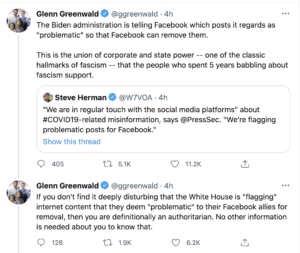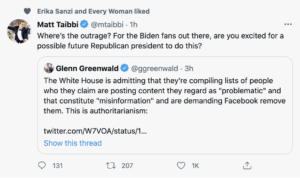Because so many people often think as obedient members America's two political teams, those of us who are free-thinkers are commonly ostracized, scorned and censored for asking obvious questions and stating obvious facts. That is, until . . . once in a while . . . on one-fine-day, the dam breaks and then it is suddenly appropriate to once again talk freely about a topic. I won't give many examples here because this is happening regarding almost every important national issue. Consider COVID masks and lab leaks, for example. This herky-jerky way of talking at each other is massively inefficient and the effect is to severely crimp human flourishing. It's like we are all attending Lord-of-the-Flies High School. I will offer three short points:
1. This has become an era of "truth infrastructures." Social teams, media operations, non-profit entities and bureaucracies on both the right and the left are coordinating together to maintain and defend their official narratives. The narrative much be honored, even if it lacks an evidentiary foundation and even if it contrary to the evidence. We need to push hard these days to get the team players to acknowledge obvious facts. Our public discourse now has the same dynamics that Thomas Kuhn attributed to science:
During the period of normal science, the failure of a result to conform to the paradigm is seen not as refuting the paradigm, but as the mistake of the researcher, contra Popper’s falsifiability criterion. As anomalous results build up, science reaches a crisis, at which point a new paradigm, which subsumes the old results along with the anomalous results into one framework, is accepted. This is termed revolutionary science.
In short, we free-thinkers need to grind away forcing evidentiary pressure build up until official narratives finally pop. Again, what a terribly inefficient way to communicate as a society.
2. There is no easy solution to this national team sport of talking at each other. We free-thinkers need to have immense amounts of stamina and courage to speak up. We are often the victims of barrages of ad hominem attacks. We need the courage to persevere in the repeated lack of apparent progress. We also need the courage to point out the mistakes of those who we might feel to be on our "own" team. Courage is the key. Nietzsche often wrote about the relationship between truth and courage. Here are several of his aphorisms on courage:
How much truth can a spirit stand, how much truth does it dare? For me that became more and more the real measure of value. Error (belief in the ideal) is not blindness, error is cowardice.
Every achievement, every step forward in knowledge, comes from courage, from harshness towards yourself, from cleanliness with respect to yourself. ..
[T]he forcefulness with which you approach truth is proportionate to the distance courage dares to advance. Knowledge, saying yes to reality, is just as necessary for the strong as cowardice and fleeing in the face of reality - which is to say the ‘ideal’ - is for the weak, who are inspired by weakness... They are not free to know: decadents need lies, it is one of the conditions for their preservation.
Even the bravest among us only rarely has courage for what he really knows . . .
Where to we get that courage and stamina? There are brave free-thinkings who go out there every day and they are leading the way. Some of my favorites include Matt Taibbi, Glenn Greenwald, John McWhorter, Sam Harris, Glenn Loury, The three hosts on The Fifth Column podcast, Abigail Shrier, Brett Weinstein, Heather Heying, Ed Snowden, Colin Wright, Claire Lehmann and the rest of the gang at Quillette, Andrew Sullivan, Eric Weinstein, New Discourses, Wilfred Reilly, Jesse Singal, Chloe Valdary, Peter Boghossian, Coleman Hughes, Bill Maher, Christina Sommers, Christopher Rufo, Benjamin Boyce, Aaron Mate, Krystal and Saagar at Breaking Points, Joe Rogan, Bari Weiss and Jodi Shaw. I'm sure that I've forgotten a couple dozen others.
Bonus points to Brett Weinstein for his recent heroics. Just be brave like these people, even though you will be ridiculed and gaslit. If you are a sincere and kind-hearted truth teller,
you will often be called names. When that happens, wear those insults like a badge of honor! You need to speak up especially when no one else is speaking up,
as Soloman Asch demonstrated in the 1950s.
3. Even when we know we are correct about our facts, we can't simply shout them from the mountaintops. We also need immense amounts of patience to neutralize the tactics used by the members of America's two Team Thinkers. We free-thinkers can't just be right. We also need to be effective by picking our spots and navigating contorted arguments containing words with upside-down definitions. Why do we need to be patient? Because our plan should be to prevail in the long run, not take snarky little shots in the short-run. Also consider that those who attack us often think that they are doing the right thing. They are often as fired up as we are. They are also convinced that the ends justifies the means, and the means include every logical and evidentiary fallacy in the book, though ad hominem attacks are the bread and butter. Our goals should be to recruit them to our side by showing them the error of their ways. For the past year, I have been writing dozens of articles at this website in an attempt to patiently collect the lost sheep.
3. I am reminded of Mahatma Gandhi's quote:
First they ignore you, then they laugh at you, then they fight you, then you win.
Instead of cordial civil discourse where people follow the
Heterodox Academy HxA Way, Our teams push and pull to win rather collaborating as individuals to tease out truths.
In sum, each of us needs the unbridled innocent curiosity of a child, the courage of a lion, and the calm patience of a diplomat. Now get out there, tell carefully articulated truths and get called names. Over and over. You will be making progress and when other quiet people see you taking some hits, they will be inspired to speak up too.


